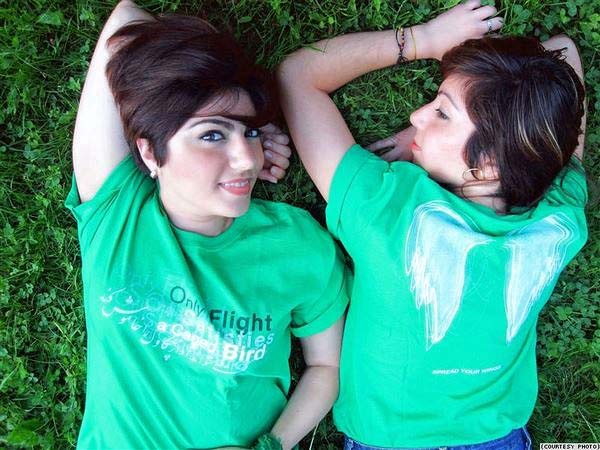Iran Feature: Two Sisters Try to Reach Their Country with Pop Music (McTighe)
Abjeez --- Melody and Safoura Safavi --- performing in Hamburg, March 2010
 On today's anniversary of the 25 Bahman protests, when tens of thousands of Iranians demonstrated in solidarity with the "Arab Spring" uprisings in Tunisia and Egypt, the main story is a political one. So, as a complement, we feature this story published by Kristen McTighe in The New York Times about two Iranian sisters and their passion for music, trying to reach those in the country that they have left:
On today's anniversary of the 25 Bahman protests, when tens of thousands of Iranians demonstrated in solidarity with the "Arab Spring" uprisings in Tunisia and Egypt, the main story is a political one. So, as a complement, we feature this story published by Kristen McTighe in The New York Times about two Iranian sisters and their passion for music, trying to reach those in the country that they have left:
The sisters Melody and Safoura Safavi blend Iranian soul rhythms with reggae, rock, ska, and flamenco, singing in their native Farsi, plus English, Spanish and Swedish. Their lyrics, at once humorous and rebellious, speak of love and politics.
They call their music Persian World Pop, for want of a better description.
“We really don’t know what else to call it. It is so far away from what people are used to,” Safoura Safavi, 29, said during an interview late last year before a concert in Stockholm. “For Iranians who haven’t heard reggae, sometimes they will ask if I’m even singing in Farsi at all.”
Born in a country where so-called Western music is deemed satanic and women are banned from performing solo, the Safavi sisters have fought to reach Iran with their music from abroad.
At the same time, with international media coverage of Iran regularly dominated by the country’s violent repression of internal dissent, its nuclear ambitions and the consequent international sanctions and confrontations, the sisters are part of a different Iranian world that struggles for visibility behind the headlines: a flourishing underground music scene, both at home and abroad, which has remained resilient despite rigid theocratic restrictions on musical expression.
They face another challenges, too, in the scattered lifestyles of their band: Safroua lives in Stockholm and travels frequently to Spain; Melody lives in New York; other band members live in cities across Sweden.
“In the beginning it was a family project, something that my sister and I did for fun,” Melody Safavi, 36, said by telephone, referring to their band Abjeez, which is Persian slang for “sisters.” “Then, when we started getting all this positive feedback from people in Iran, we realized we could really touch people with our music.”
The sisters fled Iran with their family in 1986 during the Iran-Iraq war, fearing for their safety after their father was temporarily jailed for his political activism. Revisiting the country in 2003, they found a society deprived of exposure to musical diversity. Determined to challenge the barriers, they began Abjeez in 2005.
“We wanted to show people they could experiment with new sounds, with different types of music,” said Safoura Safavi. “Iranians didn’t have to be afraid.” Melody began writing lyrics in Farsi and Safoura wrote the music. In Stockholm, they found a diverse group of backing musicians from Sweden, Norway, Scotland and Chile. Their brother, Sufi Safavi, helped them to develop their sound and took charge of management.
Together they began creating, performing, and touring across Europe. To reach Iran, they used the Internet, posting videos to YouTube and elsewhere. The video of their song “Eddeaa,” or “Pretention,” from their break-out album “Hameh,” poking fun at the clash of modern and conservative cultures, was entered in the short film competition of the 2007 Tribeca Film Festival in New York.
“The way Melody writes, it’s very easy to understand and it uses a lot of humor,” Safoura Safavi said. “We like to enlighten people to difficult issues in our culture with humor.”
"Democracy" (2007)
Now they say they want to use their music as a platform to show support for the gay and lesbian community, an issue Melody Safavi says few Iranians are bold enough to address, because of taboos.
“Gay people are getting executed because of their sexual orientation. Their families and loved ones are left alone with no social or psychological support whatsoever,” said Melody Safavi.
Though Safoura Safavi said they did not want to be merely a political band, she acknowledged that their activism was an important part of their music.
“Being an Iranian, you have no choice but to be political,” she said. “And being outside Iran, it’s our duty to speak up.”
In 2009, as violence erupted in the streets of Tehran after the disputed presidential elections, the band used their music to support the protesters.
 Kristen McTighe,
Kristen McTighe,  Melody Safavi,
Melody Safavi,  New York Times,
New York Times,  Safoura Safavi,
Safoura Safavi,  art,
art,  music
music 
Reader Comments